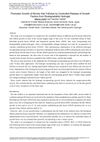Inhibitory Effects of bFGF, VEGF, and Minoxidil on Collagen Synthesis by Cultured Hair Dermal Papilla Cells
July 1996
in “
Archives of Dermatological Research
”

TLDR bFGF, VEGF, and minoxidil decrease collagen production in hair cells, possibly affecting hair growth.
This 1996 study investigated the effects of growth factors and minoxidil on collagen synthesis by hair dermal papilla cells. The researchers found that exposure to these substances decreased total collagen synthesis in both monolayer and three-dimensional collagen gel cultures. The study suggests that bFGF, VEGF, and minoxidil may have inhibitory effects on collagen synthesis in hair DPC, which may affect hair vascularization and subsequently hair growth.







